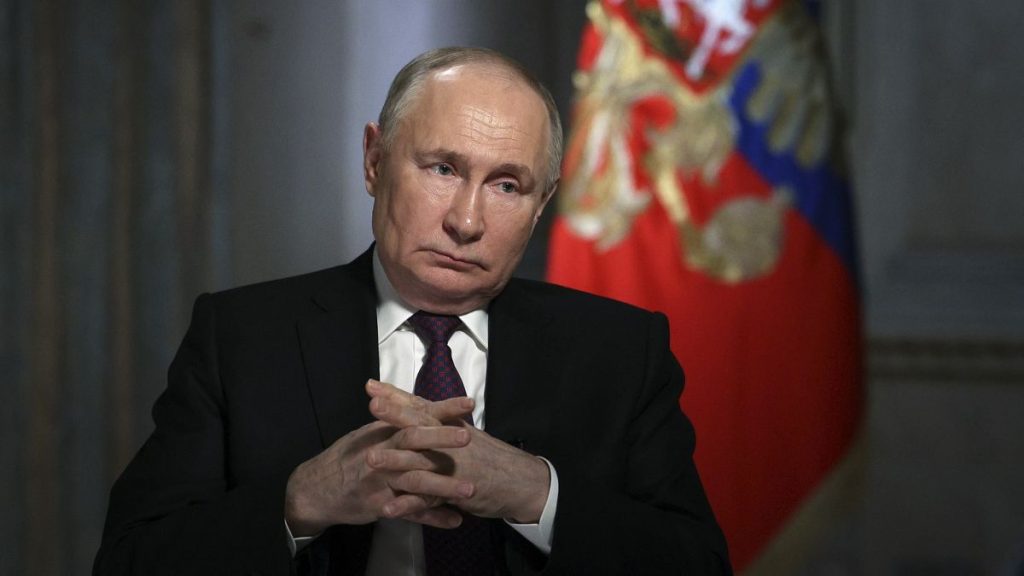President Vladimir Putin is expected to win six more years of power in Russia’s upcoming elections despite intense opposition from critics who argue that the EU should do more to crack the elite’s grip on power. Opponents of Putin, many of whom are in jail, exiled abroad, or deceased, insist that EU officials must intensify their efforts to challenge the current Kremlin regime. Despite sanctions imposed by Western allies in response to Russia’s invasion of Ukraine and crackdown on dissent, the upcoming election remains tightly controlled by Putin, leaving no room for genuine opposition.
Critics point out that the restrictive measures implemented against Russia have not been effective in curbing Putin’s power. Russian politician and opposition leader Dmitry Gudkov believes that there have been mistakes in the way sanctions have been applied. While the sanctions have hurt ordinary Russians, they have ultimately benefited Putin. The wealth of Russia’s elite has continued to increase, with the country having more billionaires than ever before. Despite Western attempts to restrict Moscow’s access to military technologies, Russia has been able to evade sanctions by selling oil above the price cap set by the G7 countries and importing banned products through friendly nations.
Russian dissidents, including Anastasia Shevchenko, who was the first person in Russia to face criminal prosecution under the Kremlin’s “undesirable organisations” law, are calling for stronger action from the European Union. Shevchenko believes that EU officials should recognize Putin’s regime as illegitimate and provide more support for Russians who have escaped the oppressive regime. Dissidents also emphasize the importance of including Russian opposition figures in the decision-making process regarding sanctions and policies aimed at challenging Putin’s rule. Despite being exiled, opposition leaders like Gudkov are urging Russians to protest by showing up to the polls and writing ‘Navalny’ on their ballots as a form of protest.
Rasa Juknevičienė, a Member of the European Parliament from Lithuania, believes that the EU lacks an effective structure for implementing sanctions against Russia due to a lack of experience in dealing with such situations. Western leaders are hesitant to take strong measures against Putin’s regime for fear of further destabilizing the situation. However, dissidents like Gudkov and Shevchenko are pushing for a more assertive stance from the EU, urging European officials to consider the expertise and input of Russian dissidents in shaping policies aimed at challenging Putin’s authority.
The EU’s sanctions against Russia have not yielded the desired results, with critics pointing out that Putin’s regime has found ways to circumvent the restrictions imposed on the country. Despite ongoing efforts to restrict Moscow’s access to military technologies and limit its ability to evade sanctions, Russia has continued to strengthen its position and increase its influence. The wealth of Russia’s elite has grown substantially, while ordinary Russians continue to suffer the consequences of the sanctions. Russian dissidents are calling for greater support from the EU and Western allies in challenging Putin’s illegitimate rule and promoting democracy in Russia.
As the upcoming elections in Russia draw near, opposition leaders are urging Russians to participate in protests and demonstrations to show their opposition to Putin’s regime. By encouraging people to write ‘Navalny’ on their ballots or tear them up as a form of protest, dissidents hope to undermine the legitimacy of the election and demonstrate the widespread discontent with Putin’s leadership. Despite the challenges and risks faced by those opposing Putin, there is a growing sense of solidarity and defiance among Russian citizens who are no longer afraid to speak out against the oppressive regime. With continued support from the EU and other allies, Russian dissidents hope to bring about meaningful change and challenge Putin’s grip on power in the country.


